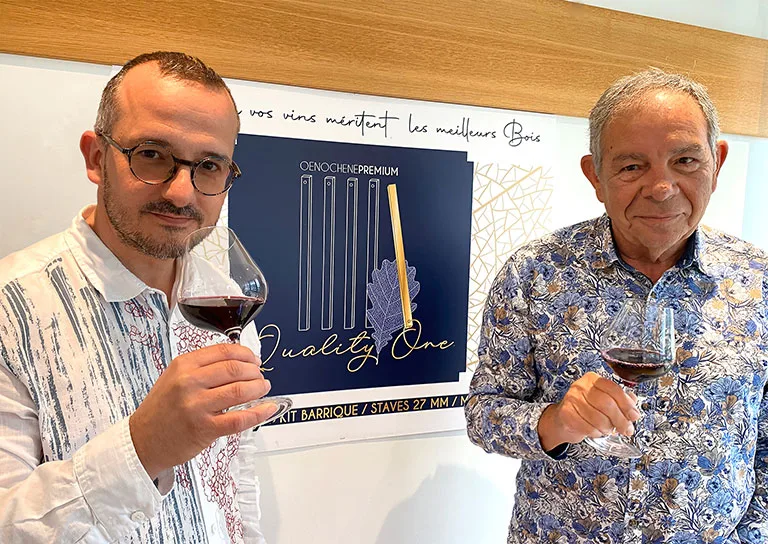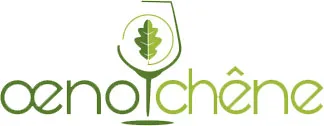La société Oenochêne
L’origine d'Œnochêne
En 1995, dans le cadre de son mandat de Président Régional des Œnologues du Languedoc-Roussillon, Jean-Luc Liberto, œnologue de formation, s’est vu confier la mission de mener une expérimentation sur les copeaux de bois en relation avec le Syndicat des Vins du Pays d’Oc.
A l’issue de cette expérimentation, l’Europe a officialisé en 2006 cette nouvelle pratique œnologique qui consiste en l’ajout de morceaux de bois de chêne dans les vins, y compris pour la fermentation des raisins frais et des moûts de raisins. C’est dans ce cadre qu’Œnochêne a vu le jour en 2006.
Créée par Jean-Luc Liberto, Œnochêne est une société spécialisée dans la production de bois de chêne pour l’œnologie. Un savoir- faire issu d’une expérimentation de plus de 15 ans permettant de fabriquer des morceaux de bois de chêne utilisés pour l’élaboration des vins afin de leur transmettre certains constituants issus du chêne.
Dirigée par Jérôme Baudin, œnologue de formation également, la société s'est installée depuis 2013 à Mauguio, près de Montpellier.
Seule usine de production de bois de chêne pour l’œnologie en Languedoc et en Roussillon, la société dispose, d’une cave expérimentale et d’une salle de dégustation.

Notre savoir-faire : Qualité & Process
Le travail du bois
La sélection du bois
Pour la sélection et l’approvisionnement en bois, Œnochêne a mis en place des partenariats forts avec des mérrandiers qui lui assurent régularité, qualité et traçabilité des bois. Le travail des bois, sur toute la longueur de la chaîne, est respectueux de l'environnement, naturel, sans aucun ajout de produit chimique.
Les morceaux de bois proviennent exclusivement des espèces de chêne :
- Le chêne français : le Quercus Petraea
- Le chêne américain : le chêne blanc d’Amérique (Quercus alba)
La maturation du bois
Le bois est entreposé à l’air libre de 24 à 36 mois. C’est à cette étape que s’accomplit une somme de réactions physico-chimiques indispensables à l’affinage de la qualité du bois.
La maturation du bois lui permet de perdre de son excès de composés tanniques désagréables et développe son potentiel aromatique par la transformation de précurseurs d’arômes jusque-là inodores.
Les étapes de la production
Œnochêne utilise donc des bois, tous issus de chênes destinés à faire des barriques. Séchés et maturés durant 24 mois minimum à l’air libre, les bois sont ensuite découpés en morceaux de tailles variables avant d'entrer dans l’élevage de vins.
Mais surtout, la spécificité d’Œnochêne est d’avoir mis au point des techniques inédites de torréfaction du bois, dont elle réussit à extraire ses meilleurs composés naturels - allant de la vanille au café en passant par le pain épicé ou le chocolat – grâce à une maîtrise des temps et température de chauffe. Œnochêne a ainsi créé une large palette de profils organoleptiques de chauffe déclinés sur les différents formats de bois proposés.
Broyage, chauffe, conditionnement et traçabilité du bois
La chauffe
Les bois sont soit laissés à l’état naturel, soit chauffés par convection de manière légère, moyenne ou forte. Les chauffes par convection (système d’air chaud ventilé) permettent d’avoir une bonne reproductibilité et une chauffe à cœur et homogène. Pendant la chauffe des bois pour l’œnologie, il se produit une transformation des polyosides du bois (cellulose et hémicellulose principalement) en composés furaniques (notes caramel, grillé), en composés énoliques (sucrosité, pain grillé), en aldéhydes phénols (vanille, épicé, boisé) en composés méthyl-lactones (noix de coco, boisé) …
L’évolution et la formation de tous ces composés sont obtenues en fonction de l’intensité de la chauffe.
Le conditionnement
L’emploi des produits est facilité grâce à un emballage adapté. Les chips, Microstaves/Blocks et ministaves sont conditionnés dans des sacs de polyéthylène de 5 Kg adaptés à une utilisation facile et mise en œuvre dans les caves.
Pour des utilisations en barrique ou autres contenants, des systèmes ont été étudiés et sont mis à la disposition des clients.
La traçabilité : un contrôle qualité rigoureux
Tous les lots réceptionnés par Œnochêne sont contrôlés et accompagnés d’un certificat d’origine.
La traçabilité du bois est assurée de la réception du bois au conditionnement. Chaque morceau de bois est contrôlé avant chaque transformation et chaque lot subit une analyse sensorielle avant la commercialisation.
La norme HACCP est mise en place depuis 2009, et nous sommes certifiés ISO 22000 : 2018 pour la production (chauffe, découpe, broyage) et conditionnement de bois pour l’œnologie.
Recherche et expérimentation
Œnochêne possède son propre bureau d’études pour expérimenter régulièrement de nouvelles techniques de chauffe afin d’innover, de découvrir de nouveaux profils aromatiques et créer de nouveaux produits.
Œnochêne est également équipée d’une cave expérimentale qui lui permet de tester directement sur les vins les produits issus du laboratoire de recherche. Ces expérimentations permettent de déterminer les meilleurs assemblages possibles entre les différents cépages et les produits d’Œnochêne.
L’équipe Œnochêne
Œnochêne c’est avant tout une équipe d’œnologues qui a développé une expertise particulière de la production des bois œnologiques.
Ils participent à la structuration du vin en étudiant quel est le meilleur produit et à quel stade de l'élaboration utiliser la gamme des bois en fonction du profil de vin souhaité. Ceci afin de répondre au mieux aux attentes des consommateurs.
Cette démarche œnologique est l'aboutissement d'un travail rigoureux de R&D à partir du bois. Nos techniciens accompagnent et conseillent leurs clients afin de créer des vins plaisirs, de créer de nouveaux vins et de susciter de nouvelles envies de consommation.
Réseau de distribution
Nos produits sont destinés à tous les professionnels de la filière viti-vinicole : caves coopératives, domaines viticoles, négociants, metteurs en marchés.
Nous distribuons en direct nos produits en France et les exportons également à travers le monde Espagne, Italie, Portugal, Maroc, Tunisie, Allemagne, Pays de l'Est, Argentine…
